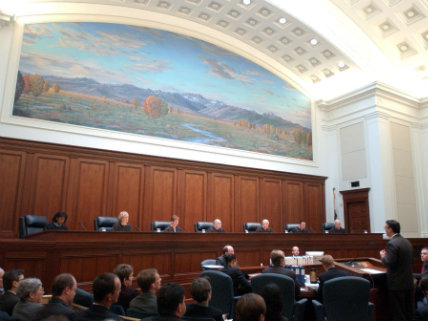Can Public Workers Get Pension Benefits Without Actually Working? California Supreme Court Will Decide
California Supreme Court accepts appeal to lower court ruling that stopped workers from padding their pensions by an extra five years of service time.

Instead of working additional years to qualify for a higher pension, some public employees in California simply can buy those better benefits.
It's a pension spiking technique known as "airtime purchases," and this week the California Supreme Court agreed to review a key ruling from last year that said the state was allowed to curtail the practice and only pay pension benefits for time actually worked. A union representing state firefighters initially sued to block that reform and is now appealing the December ruling from the state's First Appellate District Court.
It's the second major public pension case to make its way to California's highest court this year. Both are hugely important for governments and taxpayers in California, which has some of the nation's worst pension debt, and could be bellwethers for other states dealing with similar problems.
Here's how airtime purchases work. In California, like in most other cities and states where defined benefit pensions are offered to public employees, a worker's pension is based on a formula that takes into account the worker's final salary (sometimes an average of his or her salary over the last five years or so) and the amount of time working in the public sector. Play around with either of those two numbers and an employee can end up with a larger pension than the rules suggest he or she should.
Usually, when you read stories about workers "spiking" pensions to get higher payouts, it's because they have artificially increased the first figure—usually because of provisions in union contracts that allow workers to cash in unused vacation or sick days, or by bosses sharply increasing workers' salaries in the final few years before retirement. Airtime purchases allow public employees to inflate the second figure as well, increasing their time on the job (for pension purposes) without actually putting in the time on the job. In short, it allows an employee to work until age 60, for example, but retire with a pension based on a formula that assumes he or she worked until age 65.
It's all legal, of course, but that doesn't mean that it makes good financial sense for governments or the taxpayers who end up having to cover those inflated pension costs.
That's why pension reforms signed in 2011 by Gov. Jerry Brown included a provision allowing local governments to ban airtime purchases. "Pensions are intended to provide retirement stability for time actually worked," Brown said at the time.
Cal Fire Local 2881, the union representing firefighters across the state, sued over the new rules, arguing that the state constitution prohibited any reduction in pension promises. In December, the state's First Appellate District Court said the state was within its authority to curtail the bonus pension benefit. "While plaintiffs may believe they have been disadvantaged by these amendments, the law is quite clear that they are entitled only to a 'reasonable' pension, not one providing fixed or definite benefits immune from modification or elimination by the governing body," the appeals court ruled.
That ruling—along with the First Appellate District Court's ruling in another pension case, in which the court said Marin County, California, was allowed to stop workers from cashing-in unused vacation days, sick days, and other benefits in exchange for a larger pension payout—dealt what could be a serious blow to the so-called "California Rule." As Steve Greenhut wrote in Reason shortly after the August ruling in the appeals court, the so-called California Rule isn't really a rule, but "a precedent derived from a variety of rulings that date back to 1955. Ultimately, it says that once a legislative body (city council, board of supervisors, the state Legislature) grants a pension-benefit increase, that increase is indeed immutable; it can never be rolled back."
In short: under the California Rule (a version of which exists in more than a dozen states), governments are obligated to come up with the money to pay their pension promises, no matter what other services have to be reduced or what taxes must be raised.
When it comes to airtime purchases, public sector unions argue that the additional cost created by allowing this bonus benefit is covered by the extra money kicked-in by workers who purchase it. Yes, workers do "purchase" the extra time, so they are fronting some of the cost, but if it was not a net benefit for them (and thus a net cost for governments and taxpayers), they would not be doing it and certainly would not be asking the state Supreme Court to allow them to keep doing it.


Show Comments (18)